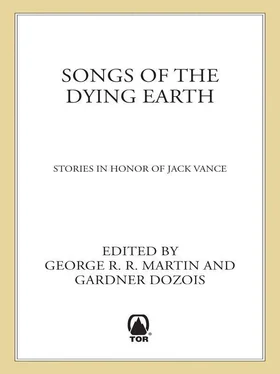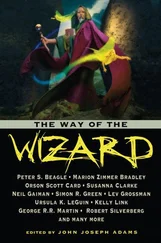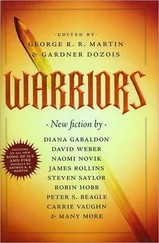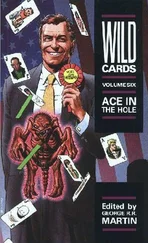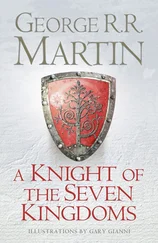Reading Jack Vance’s work today, I am transported back forty-eight years to the sounds and smells of Chicago coming in through that third-floor window on Kildare Avenue and I remember what it is like to be truly and totally and indelibly transported into a master magician’s mind and world.
— Dan Simmons
Howard Waldrop
FROGSKIN CAP
Howard Waldrop is widely considered to be one of the best short-story writers in the business, having been called “the resident Weird Mind of our generation” and an author “who writes like a honkytonk angel.” His famous story “The Ugly Chickens” won both the Nebula and the World Fantasy Awards in 1981. His work has been gathered in the collections: Howard Who? All About Strange Monsters Of The Recent Past: Neat Stories By Howard Waldrop, Night of the Cooters: More Neat Stories By Howard Waldrop, Going Home Again , the print version of his collection Dream Factories and Radio Pictures (formerly available only as in downloadable form online), and a collection of his stories written in collaboration with various other authors, Custer’s Last Jump and Other Collaborations . Waldrop is also the author of the novel The Texas-Israeli War: 1999 , in collaboration with Jake Saunders, and of two solo novels, Them Bones and A Dozen Tough Jobs , as well as the chapbook A Better World’s in Birth! . He is at work on a new novel, tentatively entitled The Moone World . His most recent book is a big retrospective collection, Things Will Never Be the Same: Selected Short Fiction 1980–2005 . Having lived in Washington state for a number of years, Waldrop recently moved back to his former home town of Austin, Texas, something which caused celebrations and loud hurrahs to rise up from the rest of the population.
Here he takes us to a Dying Earth very near at last to the end of its span, to show us that the one thing that never ceases is the quest for knowledge.
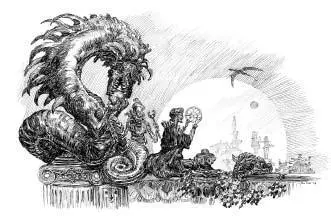
The sun was having one of its good days.
It came up golden and buttery as if it were made of egg yolk. The dawn air was light blue and clear as water. The world seemed made new and fresh, like it must have seemed in previous times.
The man in the frogskin cap (whose given name was Tybalt) watched the freshened sun as it rose. He turned to the west and took a sighting on a minor star with his astrolabe. He tickled the womb of the mother with the spider, looked away from the finger and read off the figures to himself.
A change in light behind him gained his attention. He turned — no, not a cloud or a passing bird, something larger.
Something for which men had sometimes taken dangerous journeys of years’ duration, to the farthest places of this once green and blue planet, to see and record. Now it was just a matter of looking up.
The apparent size of a big copper coin held at arm’s length, a round dot was coming into, then crossing, the face of the morning sun.
He watched the planet Venus seemingly touch, then be illuminated by the light, which suffused all around it in an instant. So it was true, then: there was still an atmosphere on the planet, even so close to the Sun as it had become (there was once an inner planet called Mercury, swallowed up long ago.) This Venus had once been covered with dense clouds; its atmosphere now looked clear and plangent, though no doubt the sunlight beat down unmercifully on its surface.
He wished he had brought his spectacle-glass with him instead of leaving it up in his tower. But he knew of tales of others, who, looking directly into the Sun with them, had become blind or sun-dazzled for years, so he sat on the wall and watched, out of the corner of his eyes, the transit of Venus til the big dot crossed the face of the sun and disappeared, to become another bright point of light on its far side.

He had found his frogskin cap while exploring some ruins in search of books many years ago. The skin was thin and papery, as living frogs had not been seen within the memory of the oldest living being, or his grandfather. The cap, then, was of an earlier time, when there still had been frogs to skin, probably while there still had been a Moon in the sky.
The first time he had put it on, it seemed made for him. Another sign from an earlier age to his times. From that day forward, his given name, Tybalt, was forgotten and people only knew him as “the man in the frogskin cap.”
This morning he was fishing where a stream rose full-blown from a cave in a cliff-face. He had a slim withey pole and a 6-horsehair line. On the end of his line was a fine hook cunningly covered with feathers and fur to resemble an insect. He was angling for fish to take to town to trade to some innkeep for lodging (and a fine meal.) He was bound for Joytown, where they would be celebrating the Festival of Mud, after the return of the seasonal rains, delayed by a full month this year (due no doubt to strong fluctuations in the Sun).
The fish in the stream at the cave mouth were eyeless of course, which did not make them lesser eating. That they had come out of the darkness was testament to the usual dimness of light from the Sun.
His artificial fly landed on the water near a rock. He twitched the line several times, setting off rings of ripples from the fly.
With a great splash, a large blind fish swallowed the fly and dove for the bottom. Tybalt used the litheness of his pole to fight the fish’s run. In a moment, he had it flopping on the bank. He put it in the wet canvas fish-bag with the three others he’d already caught, and decided he had more than enough for barter.
He wrapped his line around his pole and stuck the fly into the butt of the rod. Carrying the heavy bag over his shoulder, he continued on to Joytown.

The festival was at full peak. People were in their holiday clothes, dancing to the music of many instruments, or standing swaying in place.
Those really in the spirit were in loincloths and a covering of mud, or just in mud, returned from the wet-hill slide and the mud-pit below.
Tybalt was heartened to see that primitive sluice-machinery kept the slide wet. Perhaps the spirit of Rogol Domedonfors had never died through all the long centuries of Time. Not all was left to magic and sorcery in this closing down of the ages. The quest for science and knowledge still simmered below the swamps of sorcery.
“KI-YI-YI!” yelled someone at the top of the wet-hill slide, and plunging down its curving length, became an ever-accelerating, ever-browner object before shooting off the end of the slide and landing with great commotion and impressive noise in the muddy pit beyond.
Polite applause drifted across the watching crowd.
Tybalt had already traded the fine mess of fish (less one for his own meal.) for lodging at inn. At first, the publican, a small stout man with a gray-red beard had said “Full-up, like all other places in this town.” But as Tybalt emptied his bag on the table, the man’s eyes widened.. “A fine catch,” he said, “and supplies being somewhat short, what with the crowd eating anything that slows a little all week…” He stroked his chin. “We have a maid’s room; she can go home and sleep with her sisters. This mess of fish should be enough for — what? — two nights let’s say. Agreed?”
They put hands together like sawing wood. “Agreed!” said Tybalt.

She was a pretty girl in less than a costume. “Kind Ladies. Strong Gentlemen,” she said, in a voice that carried incredibly well, “Tonight for the first time, you will see before your very eyes, the True History of the Sun!”
Читать дальше
